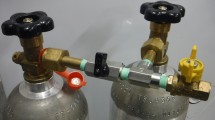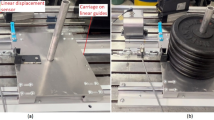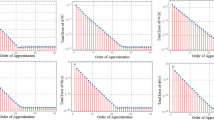Abstract
THE Lagrangian form1 of Benham's equation2, connecting the total current density with the rate of change of acceleration of particles of charge e, mass m, moving in a one-dimensional, non-uniform* electric field, may be written, for electrons, in which the numerical value of is in dynes coulomb1 gm.1 and is in amp. cm.2. The electric field, which may vary with time in any manner, is proportional to &xuml;. Omitting the constant, and writing q = dt, we obtain from (1), on integration over the interval (t – t0):
This is a preview of subscription content, access via your institution
Access options
Subscribe to this journal
Receive 51 print issues and online access
$199.00 per year
only $3.90 per issue
Buy this article
- Purchase on Springer Link
- Instant access to full article PDF
Prices may be subject to local taxes which are calculated during checkout
Similar content being viewed by others
References
Wireless Engineer, 8, 96, 489, equation 5 (1931).
Phil. Mag., 2, 462, equation 5 (1931).
See Wireless Engineer, 13, 155 (August 1936), for the relation between i e and v in the case n = 1.
Author information
Authors and Affiliations
Rights and permissions
About this article
Cite this article
BENHAM, W. Electron Inertia as the Cause of Harmonics in Valves. Nature 139, 591–592 (1937). https://doi.org/10.1038/139591c0
Issue Date:
DOI: https://doi.org/10.1038/139591c0
Comments
By submitting a comment you agree to abide by our Terms and Community Guidelines. If you find something abusive or that does not comply with our terms or guidelines please flag it as inappropriate.



